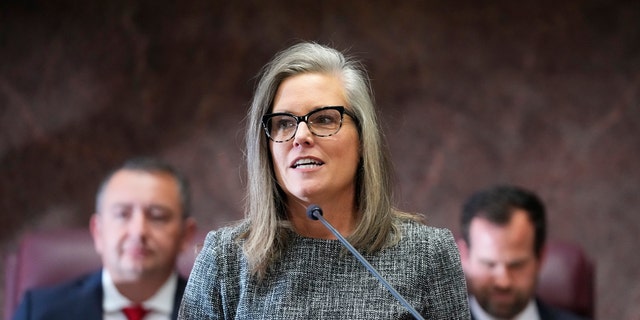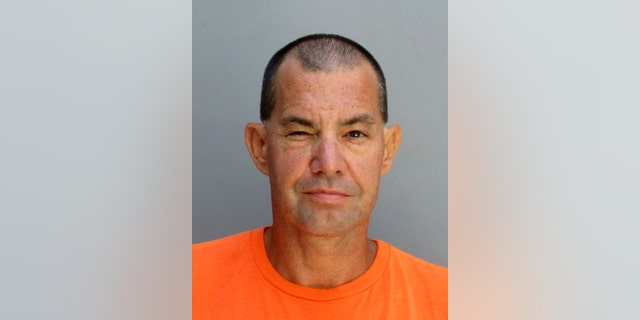Arizona Gov. Katie Hobbs scrutinized for plans to disregard court order authorizing execution
Arizona Gov. Katie Hobbs is facing criticism for planning to disregard a court order authorizing the execution of Aaron Gunches, the man convicted in the November 2002 killing of Ted Price near Mesa.
Hobbs said nearly two weeks ago the state will not carry out the execution of Gunches on April 6 because she is not confident that laws are being followed.
The Democratic governor ordered a review of Arizona’s death penalty protocols in January due to the state’s history of mismanaging executions, according to The Associated Press.
Over the past week, lawyers for Maricopa County Attorney Rachel Mitchell and Karen Price, the sister of the victim, have told the Arizona Supreme Court that Hobbs does not have the legal authority to defy the order.
ARIZONA GOV. HOBBS VOWS NOT TO CARRY OUT COURT-ORDERED EXECUTION
In a statement to The AP, Price said the relief her family felt when the court scheduled Gunches’ execution was dashed by Hobbs’ announcement.
“Not only has our family been victimized by inmate Gunches and the emotional aftermath of Ted’s murder, we are now being victimized by the governor’s failure to recognize and uphold our constitutional rights to justice and finality,” Price said.
Nicholas Klingerman, who is representing Mitchell, said no constitutional violations have been found with Arizona’s execution protocols, adding that Hobbs cannot opt out of carrying out execution warrants.
“Nothing in the Constitution or laws of Arizona or the warrant gives the governor discretion to ignore the warrant and grant what essentially constitutes a temporary reprieve from the death penalty,” Klingerman wrote.
In a filing on Wednesday, lawyers for Hobbs said the court should not take up Price’s appeal because the state is not currently prepared to carry out an execution in a constitutionally sound manner. The filing also said the corrections department lacks staff with expertise, according to The AP.
Hobbs’s lawyers wrote that the state does not have a contract for a pharmacist to compound the pentobarbital needed for an execution at the moment, and corrections officials are not able to identify the state’s previous compounding pharmacist. It was also noted that a top corrections leadership position critical to planning executions is open.
ARIZONA GOV. KATIE HOBBS ANNOUNCES NEW POSITION TO REVIEW DEATH PENALTY CASES

Corrections Director Ryan Thornell said he was unable to find enough documentation to understand key elements of the execution process and instead has had to piece information together through conversations with employees present at past executions.
Richard Dieter, executive director of the objective Death Penalty Information Center, said he believes Hobbs has the power to halt executions if she is concerned about the way they are being carried out.
“She has the power to make sure that that’s functioning properly,” said Dieter, whose group does not take a position on the death penalty but is critical on how it is carried out.
Dale Baich, a former federal public defender who teaches death penalty law at Arizona State University, told The AP that Hobbs has “discretion for situations like this, where the governor has expressed legitimate concerns because of the problems with the (lethal injection) drugs, the qualifications of the executioners and staffing at the Department of Corrections necessary to carry out executions.”
Mel McDonald, a former U.S. Attorney for Arizona who handled two death row cases as a prosecutor, predicted the state Supreme Court would take up the appeal filed by Price’s sister, saying the dispute presents the court with novel legal issues and raises a lot of questions.
AZ INMATE ON DEATH ROW WITHDRAWS HIS REQUEST TO BE EXECUTED

Gunches was sentenced to death after pleading guilty to the fatal shooting of Ted Price, the ex-husband of his girlfriend. He represented himself in court in November when he asked the Supreme Court to issue his execution warrant so “justice could be served and the victims could get closure.”
During his last month in office, Republican Attorney General Mark Brnovich asked the court for a warrant to execute Gunches, but then the inmate withdrew his request in early January and newly elected Democratic Attorney General Kris Mayes asked for the warrant to be withdrawn.
The state Supreme Court rejected Mayes’ request and said an execution warrant must be granted if certain proceedings have concluded – and they had in Gunches’ case.
In a filing a week ago, Gunches said he still wants to be executed and asked to be transferred to Texas because “the law is still followed and inmates can still get their sentences carried out.” Arizona’s highest court denied the request.
Arizona currently has 110 prisoners on death row. In 2022, the state executed three inmates, ending a nearly eight-year hiatus following a botched 2014 attempt and difficulties obtaining the necessary drugs.
Since resuming executions, the state faced criticism in May for taking too long to insert an IV for lethal injection into a prisoner’s body. It was also slammed for denying the Arizona Republic newspaper’s request to witness the last three deaths.
The Associated Press contributed to this report.
Read the full article Here


